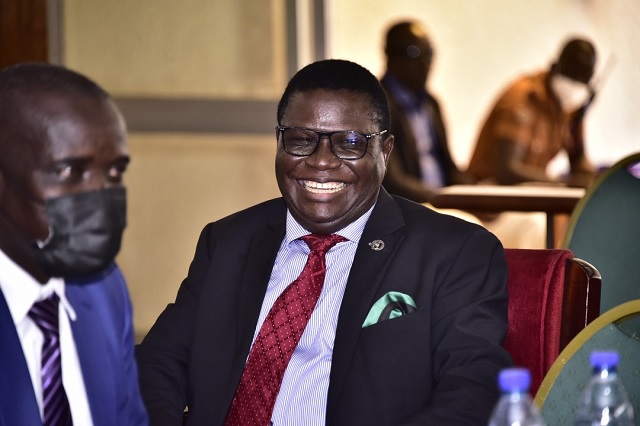
Kampala, Uganda | THE INDEPENDENT | A court in Kampala has declined to issue criminal summons against Norbert Mao, the Democratic Party President who also doubles as the Minister of Justice and Constitutional Affairs. Male Hassan Mabirizi, a renowned Kampala lawyer filed an application requesting the Law Development Centre-based magistrate court to issue criminal summons against Mao, Kiwanuka Mayambala, the DP national chairman, and DP Secretary General Gerald Blacks Siranda to answer charges of uttering false documents.
Mabirizi had instituted a private prosecution against the trio alleging that they had committed offenses of forgery contrary to sections 342 and 345 of the Penal Code Act, Cap 120 when they presented the Electoral Commission Minutes of the Democratic Party delegates conference on September 3, 2021, which they said had taken place between September 18-20, 2020 whereas it wasn’t true.
By doing this, Mabirizi argued, the trio aimed at deceiving and defrauding both the Electoral Commission and the public. Mabirizi argued that it was important that the court issues criminal summons or at least issue a notice mention so that the trio can be heard as dictated by law. He argued that any proceeding in criminal matters must take place in the presence of an accused person.
In his ruling, the senior principal Magistrate Grade One, Kirya Martins, laid down the conditions under which someone can institute a private prosecution. “A private prosecutor has two hurdles to surmount; he must persuade a magistrate to issue summons and the magistrate has the discretion to issue or not. In issuing, he has to ascertain at least; whether the allegation is of an offence known to law and if so, whether the essential ingredients of the offence are primacie, present that the time limits have been complied with, that the court has jurisdiction, whether the informant has the necessary authority to prosecute. It would therefore appear that the right to private prosecution emanates from the administrative failings of the Director of Public Prosecution to execute her mandate,” Kirya’s 15-page ruling reads in part.
It adds that the applicant has also to demonstrate with evidence in his complaint that the prosecuting agency has remained in limbo upon a commission of an offense and that the complainant has duly notified him of the need to undertake the prosecution.
“This is the only way our criminal prosecutions can be handled with total observance of the parameters set out under Article 120 of the constitution; short of which it will be encouraging parallel authorities to institute criminal proceedings,” Kirya’s ruling reads in part.
On scrutiny, it notes, Mabirizi’s application failed to demonstrate the inactivity of the office of the DPP to prosecute the alleged offence committed by Mao and his colleagues. Kirya also ruled that Mabirizi failed to follow the laid down procedures of getting a letter from the area chief where the alleged crimes were committed. In his application, Mabirizi said the Magistrate Act that mandates getting a letter from a local chief was old law that should be disregarded. But in his ruling, Kirya said if he does that, he will not only have amended a law passed by parliament but it will also be a violation of the higher court’s ruling on the matter.
“In the Basajjabala case, this requirement was held to be mandatory and it is still good law that binds this court under the doctrine of precedent. Hence no amount of submission can lure this court into a departure from the already established procedure. Any attempt would mean that a lower court has overruled the decision of a higher court which is contrary to the established principles of law. Merely having a detailed procedure in law does not mean that it is a denial of access to justice as argued by the applicant…A denial of access to justice resides in an outcome of the inaccessible or preposterous judicial process which prevents the individual from obtaining the remedy in courts of law,” Kirya ruled.
He also added that Mabirizi failed to prove that indeed the crimes for, which he wanted the court to issue criminal summons against Mao, were committed in an area where the court has jurisdiction.
“There is no mention of where the DP party offices are located for this court to be able to determine its territorial jurisdiction which gives mandate over the compliant. Yet again the applicant said the false documents were uttered at the Electoral Commission offices but they were not specific where within Kampala. LDC court does not have a monopoly over all areas of Kampala. Assuming the applicant was talking about EC headquarters, the LDC court doesn’t cover Jinja Road where the alleged offense of uttering false documents emanates. The above therefore renders this court incapable of entertaining this application for want of territorial jurisdiction over the complaint because there was no indication that either the intended accused persons reside or be in the jurisdiction of LDC court or that the offences took place in areas within the coverage of LDC court,” Kirya ruled before dismissing the application.
*****
URN
 The Independent Uganda: You get the Truth we Pay the Price
The Independent Uganda: You get the Truth we Pay the Price



